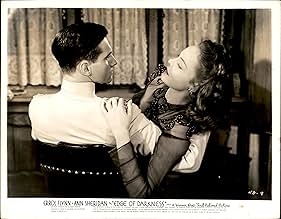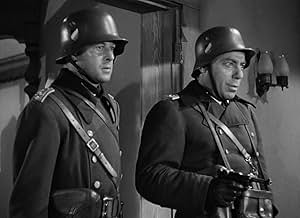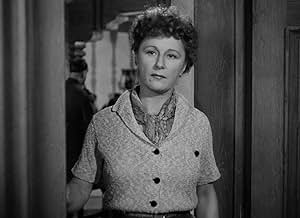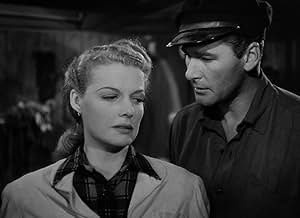Adicionar um enredo no seu idiomaAfter two years under German rule, a small Norwegian fishing village rises up and revolts against the occupying Nazis.After two years under German rule, a small Norwegian fishing village rises up and revolts against the occupying Nazis.After two years under German rule, a small Norwegian fishing village rises up and revolts against the occupying Nazis.
- Direção
- Roteiristas
- Artistas
- German Lieutenant
- (não creditado)
- Townsman
- (não creditado)
- Petersen
- (não creditado)
- Maj. Ruck
- (não creditado)
- Direção
- Roteiristas
- Elenco e equipe completos
- Produção, bilheteria e muito mais no IMDbPro
Avaliações em destaque
Errol Flynn is cast in the lead as a Norwegian patriot who is slowly and very covertly trying to plan for a rebellion against their Nazi overlords. Interestingly, while Flynn and the rest do not sport Norwegian accents, the film (and in particular, Flynn's performance) is generally understated. This helped make the film seem more realistic and heightened the emotional impact.
In addition to Flynn, the film also stars Ann Sheridan, Walter Huston and Ruth Gordon. However, unlike most Warner Brothers films of the day, the usual cast of supporting actors (Allen Jenkins, Frank McHugh, Alan Hale and the rest) are absent. This was a good decision, as the usual "comic relief" style of support is --replaced with a gritty yet believable group of actors.
What I also liked about the film was that while the Nazis were very brutal and evil, they were not quite so over-the-top as they were in many propaganda films of the day. Yes, they murdered and even raped, but the whole thing was handled more realistically than many films--the Germans were not parodied or ridiculous--making them all the more scary.
The film ends with a terrific final confrontation scene between the Norwegians and the Nazis. It was very deftly filmed and was super-exciting.
All in all, this is one terrific film--mostly due to realism and excellent performances all around--from direction to sets to writing to acting to cinematography. A real stand out among the crowded pack of American WWII films.
Leading man Errol Flynn turns in perhaps his best job of acting. His dashing image is completely lost in the role of a humble fisherman not entirely confident as the leader of the local Resistance movement. No dashing uniform here, just a pea coat and a plain merchant sailor's cap. And no mustache! Flynn and leading lady Ann Sheridan both turn in the solid, understated performances their roles called for, but it is a superb cast of supporting players that really shines in this one. One of the great charms of this memorable movie is the rich character development amongst the supporting parts. Walter Huston, as the town doctor trying to sit the fence, and Judith Anderson, as a Resistance worker hopelessly in love with a German soldier, are dominating as always. But the show is practically stolen by Roman Bohnen, as a henpecked, middle-aged store keeper with dreams of glory, and the ubiquitous Henry Brandon, as a suave SS officer who may not be all he seems. Helmut Dantine, a refugee Austrian anti-Nazi in real life, plays the German commandant with razor-edge ruthlessness. Likewise outstanding are Ruth Gordon as the doctor's sadly unbalanced wife, Charles Dingle as her Quissling brother, John Beal as her wavering Quissling son, and Nancy Coleman as the commandant's frightened Polish mistress. Monte Blue, Frank Wilcox, Art Bridge, and Morris Carnovsky add their always reliable presences. Thanks to consummate acting skill, Rossen's intelligent script, and Milestone's precise direction, you will come to know these characters as well as your neighbors by the shattering end of this two hour movie.
Franz Waxman's florid score themed on Martin Luther's stirring hymn "A Mighty Fortress Is My God" with snatches from Wagner sweeps the action along to a rousing climax.Sid Hickox is credited for the sublime cinematography, but as I have stated elsewhere (see my review of The General Died At Dawn), Milestone's graphic statement was the same no matter who was behind the camera or in the editing room. Sweeping camera, silky smooth scene changes with creative dissolves, panning mise-en-scene were all the master's trademarks -- much imitated and highly influential on the film noir style that came to dominate pictures of all genres during the 1940's. Notice how at the beginning of the final scene in Edge of Darkness the flapping flag dissolves into a sheet of paper in a typewriter!
Edge of Darkness is a classic of the war/intrigue genre and one of the great movies of all time. First rate Old Hollywood entertainment from the master Lewis Milestone.
A surprisingly very strong version about Norwegian resistance with career-best interpretations from Errol Flynn and Ann Sheridan . With a spectacular opening reminiscent of 'Beau Gest' , the film gets action , pretty downbeat deeds , intense drama with moments of extraordinary power and breathtaking final battle . Although numerous problems happened throughout shooting , this movie contains impressive images and submitted performances . Director tries to expose war for what it is and not glorify it . Very well camera work by cameraman Sidney Hickock . Thrilling and evocative musical score by the classic Franz Waxman . Rating : Above average , the flick earned big high marks for its superb scenarios , credible acting and dramatic scenes .
This War/drama is compellingly directed by Lewis Milestone , he was born in the Ukraine , but emigrated to America at 18 and he served in WWI becoming an assistant director on Army training films . Then War returned and Lewis was in thick of it with several fictional movies and a documentary . He often made chronicles of wartime conflicts and persisted in showing horror war from the point of view of the ordinary soldier . Milestone was using what he felt were the best means at his disposal to express his own philosophies about war in particular . Milestone's niche in movie history is secure with his War films and it is on these pictures that his reputation rests . As he showed WWI , winning Academy Award for ¨All quiet on the western front¨ , and WWII such as ¨Purple heart¨ , ¨Halls of Montezuma¨ , ¨Edge and darkness¨ , the best of which is ¨A walk in the sun¨ with remarkable intensity at times and Korean war as ¨Pork Chop Hill¨ ; and directed several others excellent movies in different fields , dramas as ¨Of mice and men¨ , Noir cinema as ¨Strange love of Martha Ivers¨, adventure as ¨Mutiny on the Bount¨ and heist-comedy as ¨Ocean's eleven¨, among others.
The picture is set during German invasion of Norway and subsequent Nazi conquest , the historical events are the following : The invasion began on April 9, 1940. The German Navy and Airforce led the operation . The Hitler plan relied on surprise to avoid interception by the British and to prevent Norwegian forces from mobilizing. The sudden appearance of naval task forces took Norwegian defenders by surprise and allowed airfields around Oslo , Tondheim and Stevenager to be captured by the German intact. German forces at Trondheim advanced and linked up with forces in Oslo. Norwegian forces in central and southern began to surrender. In northern Norway British and French troops fighting against Germans in Narvik . But the Allied decided to pull out of Norway , evacuating forces from Narvik . After that , Nazi conquest was completed with help some collaborators as the famous ¨Quisling¨ who was a Norwegian prime minister whose collaboration with the Nazis meant his name became a term meaning traitor and in this film is represented by the Walter Huston , Ruth Gordon's son , John Beal .
Você sabia?
- CuriosidadesAccording to the book "The Films of World War II" by Joe Morella, Edward Z. Epstein and John Griggs, the production was beset by many problems. The book states, "Ann Sheridan parted from husband George Brent; Errol Flynn was indicted for rape; location shooting in a small California town was delayed several weeks because of fog, during which Ruth Gordon and Judith Anderson were besieged with telegrams from Katharine Cornell demanding their return to New York for her stage production of 'The Three Sisters'. Miss Gordon was restrained from leaving, but not before letting it be known that she hated Hollywood and the picture. Fortunately for Warners, the fog lifted, Flynn was acquitted, and the film was completed."
- Erros de gravaçãoAfter Gunnar (Errol Flynn) says to Karen (Ann Sheridan), "When my father was my age, he already had two children", there's an obvious jump cut indicating some dialogue had been deleted; this likely was due to a failure to gain acceptance by the Production Code censors.
- Citações
Captain Hauptmann Koenig: What do you want?
Sixtus Andresen: I... thought it only right, considering that you are... de facto commandant of the village, to acquaint you with a decision that I've made.
Captain Hauptmann Koenig: I'm very busy.
Sixtus Andresen: I know. I hope you'll forgive me. I know I'm being selfish. But, uhh... Why did you want my house?
Captain Hauptmann Koenig: For a block house! But what was it you wanted to see me about?
Sixtus Andresen: I cannot let you have my house.
Captain Hauptmann Koenig: You what?
Sixtus Andresen: I must forbid you to enter my house.
Captain Hauptmann Koenig: [laughs hysterically] Are you insane? I could have you shot!
Sixtus Andresen: I know. But if you're interested, I'll tell you what brought me to my conclusion, which is, I can assure you, completely unshakeable. You see, I am well past seventy, and at my age it would be foolish for me to be like Socrates' enemies, and fear death more than I love truth.
Captain Hauptmann Koenig: Go on!
Sixtus Andresen: ...I have no guns, no airplanes, no force. I disdain.
Captain Hauptmann Koenig: SILENCE!
Sixtus Andresen: What you don't understand is that the individual man...
Captain Hauptmann Koenig: QUIET, YOU FOOL!
Sixtus Andresen: - The individual man must stand against you like a rock.
Captain Hauptmann Koenig: [shaking Andresen] Will you STOP!
Sixtus Andresen: [calmly] No. If I were afraid, there might be hope for you, but I am not.
[Koenig slaps Andresen across the face]
Sixtus Andresen: There are certain things you cannot take away from me... What is mine, is mine. Do you think you can stop the working of my brain and my heart?
[slap]
Sixtus Andresen: We are not animals; we are men.
[slap]
Sixtus Andresen: That is the foundation of law - you cannot win.
[slap]
Sixtus Andresen: Where are your courts?
[slap]
Sixtus Andresen: Your judges?
[slap]
Sixtus Andresen: And your juries?
[slap]
Sixtus Andresen: Until you bring them forward, I must forbid you my house.
Captain Hauptmann Koenig: HE 'FORBIDS'!
[knocks the old man down the stairwell]
- ConexõesEdited into O Extraordinário Marinheiro (1969)
- Trilhas sonorasA Mighty Fortress is Our God (Ein' Feste Burg)
(uncredited)
Traditional German hymn
Lyrics by Martin Luther (1535)
English translation by Frederick H. Hedge (1853)
Played and sung offscreen by an unidentified chorus during the opening credits, in the church,
and at the end
Variations in the score throughout
Principais escolhas
- How long is Edge of Darkness?Fornecido pela Alexa
Detalhes
Bilheteria
- Orçamento
- US$ 1.653.000 (estimativa)
- Tempo de duração1 hora 59 minutos
- Cor
- Proporção
- 1.37 : 1
Contribua para esta página






































